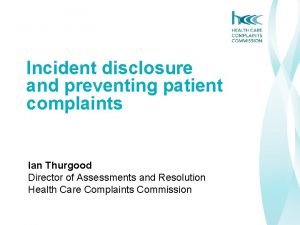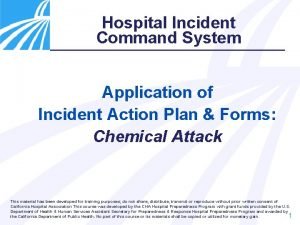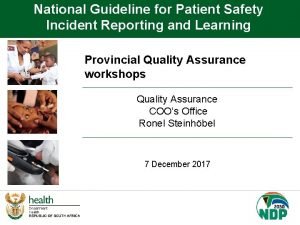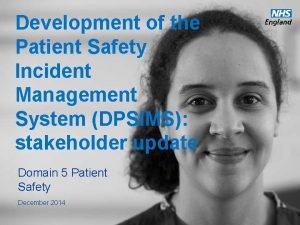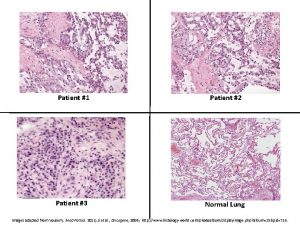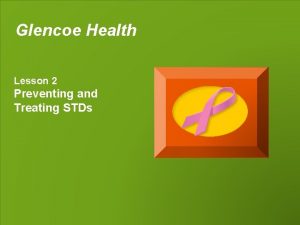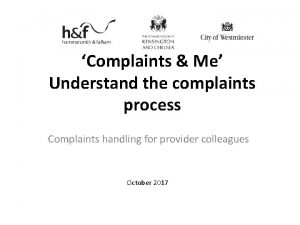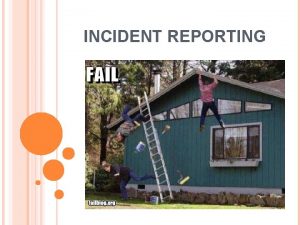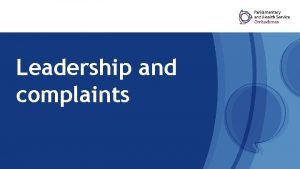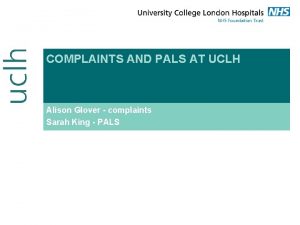Incident disclosure and preventing patient complaints Ian Thurgood












- Slides: 12

Incident disclosure and preventing patient complaints Ian Thurgood Director of Assessments and Resolution Health Care Complaints Commission

Why do people complain? People complain because something happened that they are not happy about. People escalate complaints, because they: § do not trust the provider § have a grievance against the provider § may have unsuccessfully tried to raise their complaint, but do not feel heard § feel over-powered by the provider

What do people want? People want: § to be heard and acknowledged § an explanation of what happened and why § an apology § see action to prevent it from happening again § disciplinary action

Managing incidents • Internal disclosure (mandatory for serious incidents; best practice for less serious incidents) • Disclosure to patient and families (mandatory for serious incidents; best practice for less serious incidents) • Disclose to colleagues and team to improve quality and safety (willingness, culture) -> Successfully managing an can prevent complaints. -> Not or ineffectively managing incidents can trigger a complaint.

Reluctance to provide information and apologise § Fear of legal liability § Damage of professional standing – Medical negligence – Disciplinary actions § Do not know how to do it properly -> Apologies protected by law -> Providing information that you are certain of in good faith will not be used against you

A case study Hospital writes to a woman who had lost her first baby, expressing their condolences and stating that it had undertaken an root cause analysis and enclosed the recommendations: § Tocograph was outdated and had been replaced § Staffing level did not contribute to the event but were at a level of concern; an escalation plan has been put in place Outcome: Written apology not accepted as genuine. The woman immediately complained to the HCCC after receiving the letter.

Managing incidents What you have to consider When managing incidents, it is important to consider: § What are the patient’s / family’s expectation. What do they want to know? § How serious is the impact of the incident for patient/family? § What is the most appropriate way to communicate § Is the surrounding supportive? § Who shoul be involved? Neutral facilitator needed? -> Most importantly, be genuine and sincere.

Managing incidents The process 1. Respect the patient’s / family’s perspective 2. State the relevant facts: what happened, what went wrong? 3. Stay calm and explain in a way the patient and their family understand 4. Clarify the degree of responsibility (system/individual) and apologise 5. Listen to the patient’s reaction, don’t be defensive 6. Offer a solution / support / assistance

Preventing complaints summary § Timely and proactive disclosure of incidents § Being responsive to patient/family’s needs § Successfully managing an incident is a process § Effectively managing an incident may prevent a complaint § If the incident is not or inadequately managed, the likelihood of a complaint increases.

10

‘The new world of transparency can be daunting, requiring substantial changes in many practices and ways of thinking. The benefits for our patients, and for ourselves, can be tremendous. ’ Lucian L. Leape, MD, Professor of Health Policy at Harvard University Source: The Physician Executive, March, April 2006, p. 18.

Thank you. For more information, visit www. hccc. nsw. gov. au
 Ian thurgood
Ian thurgood Thurgood marshall childhood
Thurgood marshall childhood Incident objectives that drive incident operations
Incident objectives that drive incident operations Patient safety incident reporting form
Patient safety incident reporting form Safety incident management system
Safety incident management system Patient 2 patient
Patient 2 patient Chapter 24 lesson 2 preventing and treating stds
Chapter 24 lesson 2 preventing and treating stds Chapter 9 lesson 2 resolving conflicts
Chapter 9 lesson 2 resolving conflicts Chapter 14:1 using body mechanics
Chapter 14:1 using body mechanics Chapter 9 resolving conflicts and preventing violence
Chapter 9 resolving conflicts and preventing violence Chapter 13:2 preventing accidents and injuries
Chapter 13:2 preventing accidents and injuries I consider your behavior rude irresponsible and offensive
I consider your behavior rude irresponsible and offensive Resolve hrs
Resolve hrs
